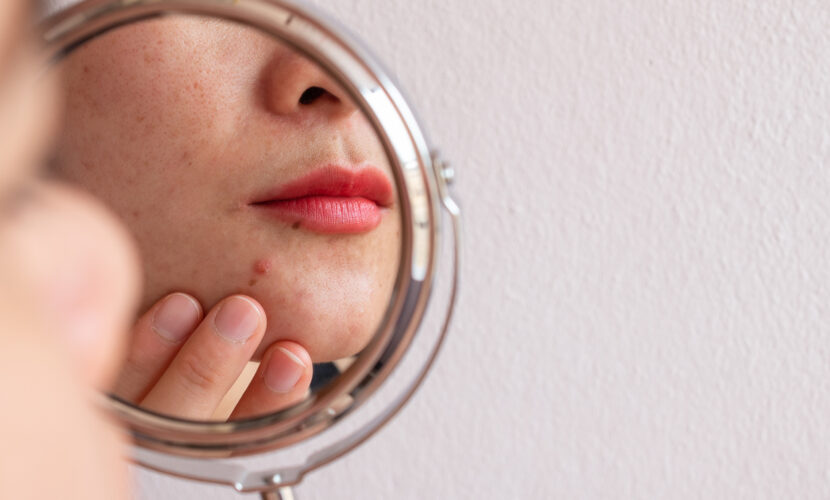Acne problems are common among people of all ages, from teenage students to adults in their 20s and beyond. Effective skin care is especially important for those with oily skin. Excessive sebum production and clogged pores can easily lead to acne, and proper care is essential to remedy the problem.
Here we detail comprehensive measures to combat oily skin acne, from its causes to effective cleansing methods, basic skin care steps, and lifestyle modifications. Information is provided to help students and adults alike find the right skincare regimen for them.

Graduated from the Faculty of Medicine, National Kumamoto University. After serving as the director of major beauty clinics in Japan, etc., he opened Aladdin Aesthetic Clinic in 2023. He is a professional in aesthetic medicine with a doctorate in anti-aging research and many years of experience. With the motto of "Toward the realization of cosmetic medicine without lies," he aims to be the "Only One" together with his patients.
- Know the causes of acne and the characteristics of oily skin!
- How should you care for oily skin? 9 easy to practice care in daily life!
- Point 1|Morning and evening face wash
- Point 2|Post-exercise care
- Point 3|A hypoallergenic facial cleanser
- Point 4|Components that control oil content
- Point 5|Correct face washing steps
- Point 6|Alcohol-free lotion
- Point 7|Moisturizing lotion
- Point 8|Selection of light emulsions and serums
- Point 9|Use of sunscreen
- Improve oily skin through lifestyle changes!
- summary
Know the causes of acne and the characteristics of oily skin!

Acne is one of the most troublesome skin problems for many people. Among them, we are concerned about acne on oily skin, its characteristics and how to cure it. First, understanding the root causes of acne will make it easier to find effective skin care methods, so here we will look at the specifics, including the differences between different age groups from teens to 20s and beyond.
Main causes of acne
Acne is a vexing problem for many people. For adolescents in particular, the occurrence of acne is an unavoidable challenge. The main causes of acne are hormonal imbalance, excessive sebum production, and bacterial growth.
| primary factor | Details |
|---|---|
| Hormonal imbalance | It is seen mainly during puberty. Also seen in menstrual cycles, pregnancy, and menopause, as well as in hormonal imbalance. |
| Excessive secretion of sebum | Excessive sebum secretion from sebaceous glands clogs pores. |
| Bacterial growth | Acne bacteria proliferate and cause inflammation. |
| Other Factors | The daily environment and diet also affect the development of acne. |
Among these, changes in hormonal balance are especially noticeable during teenage puberty. During this period, the secretion of hormones called androgens increases in the body. Androgens stimulate sebaceous glands, causing excessive sebum secretion. Sebum originally serves to protect and moisturize the skin, but excess sebum can clog pores.
In addition, hormonal fluctuations during life stages such as menstrual cycles, pregnancy, and menopause can also cause adult acne.
Sebum, secreted by the sebaceous glands, is also necessary to maintain the skin's barrier function and prevent dryness. However, excessive sebum secretion due to hormonal influences, genetic factors, or stress can easily clog pores.
When pores are clogged with sebum, the inside of the pore is in an oxygen-free state, creating an environment conducive to the growth of acne bacteria (Cutibacterium acnes). The acne bacteria feed on sebum and multiply, causing inflammation inside the pores. As this inflammation progresses, it develops into red, swollen pimples or pus-filled pimples. Acne bacillus is a common bacterium and is present even in healthy skin, but its effects are more pronounced when pores are clogged.
Teenage acne
In the teenage years, rapid hormonal changes are the primary cause of acne. As mentioned earlier, the increase in androgens during puberty stimulates sebaceous glands, causing excessive sebum secretion. Hormonal fluctuations during this period are inevitable and tend to increase skin problems because of the continued activation of sebaceous glands.
Acne during this period is particularly concentrated on the forehead and cheeks, where clogged pores cause red, inflamed acne, white acne, and black acne to appear.
Acne after 20s
In the 20s and beyond, hormonal balance changes settle down, but stress and lifestyle have a greater impact. Stress at work and at home, irregular lifestyle, and improper skin care are the main causes of acne during this period.
In addition, acne may occur due to residual hormonal effects or fluctuating hormonal balance caused by the menstrual cycle.
Characteristics and Problems of Oily Skin
Oily skin has active sebaceous glands, which cause the face to be constantly shiny. Sebum originally serves to protect and moisturize the skin, but in excess it can clog pores and cause acne. The T-zone (forehead, nose, and chin) in particular produces a lot of sebum and is prone to acne.
The first and most important characteristic of oily skin is that the sebaceous glands secrete excessive amounts of sebum. Sebum plays an important role in strengthening the skin's barrier function and protecting it from dryness and external stimuli. However, excessive sebum can clog pores and cause acne.
Excessive sebum secretion can enlarge pores and make them more visible. People with oily skin tend to have enlarged pores, especially around the nose, forehead, and chin, and the sebum oxidizes to form blackheads and keratin plugs. This can result in poor skin appearance and poor makeup application.
Oily skin is prone to acne outbreaks when sebum clogs pores. When pores become clogged, sebum and dead skin cells accumulate instead of being expelled, creating an environment in which acne bacteria can easily multiply.
How should you care for oily skin? 9 easy to practice care in daily life!

For those with oily skin, proper cleansing is essential for preventing acne and maintaining skin health. To properly control excessive sebum and prevent clogged pores, it is important to develop a correct face-washing habit. Here, we will explain in detail the proper way to wash your face for oily skin.
Point 1|Morning and evening face wash
For oily skin, the basic rule is to wash your face twice a day. Morning cleansing is important to remove sebum and sweat secreted during sleep and to keep skin clean. The nighttime face wash removes the day's dirt, makeup, and sebum to maintain normal skin turnover.
Point 2|Post-exercise care
After exercise, sweat and sebum are easily secreted, and pores are easily clogged. Therefore, after exercise, be sure to wash your face to thoroughly wash away sweat and dirt. The key is to wash gently so as not to stress the skin.
Point 3|A hypoallergenic facial cleanser
People with oily skin tend to use strong cleansers to remove excessive sebum, but this can have the opposite effect. Strong cleansing ingredients can damage the skin's barrier function and further increase sebum production. Therefore, choose a hypoallergenic cleanser to reduce the burden on the skin.
Point 4|Components that control oil content
Facial cleansers containing ingredients that control sebum secretion are suitable for oily skin. For example, ingredients such as salicylic acid and tea tree oil can control sebum secretion and prevent clogged pores. By choosing a facial cleanser containing these ingredients, the occurrence of acne can be prevented.
Point 5|Correct face washing steps
Use lukewarm water, which is gentle on the skin, to wash your face. Avoid hot water, as it excessively removes oil from the skin, causing it to dry out. Wet your face with lukewarm water and whip up a facial cleanser. Lather the cleanser thoroughly in the palm of your hand and gently apply it to the entire face. Massage in a circular motion with your fingertips, but be careful not to rub. Wash carefully, especially in the T-zone, which secretes a lot of sebum.
Rinse thoroughly with lukewarm water so that no foam is left on the face when rinsing. It is important to rinse thoroughly because any cleanser left on the skin can clog pores and cause acne.
After washing your face, wipe off the moisture by gently pressing down with a soft towel. Since rubbing with a towel can irritate the skin, gentle pressure is sufficient.
Point 6|Alcohol-free lotion
For people with oily skin, the choice of lotion is very important. Although lotions containing alcohol give a temporarily refreshing feeling, they may strip the skin of too much moisture. This can cause excessive sebum production, so choosing an alcohol-free lotion is recommended.
Point 7|Moisturizing lotion
Moisturizing is necessary even for oily skin. Choose a lotion that contains moisturizing ingredients such as hyaluronic acid, glycerin, and ceramide. These ingredients strengthen the skin's barrier function and protect the skin from external stimuli.
Use the toner immediately after cleansing the face. Take an appropriate amount in the palm of your hand and apply it to the entire face, pressing it gently. If using a cotton pad, it is best to soak it generously with lotion and apply it to the skin with a light patting motion.
Point 8|Selection of light emulsions and serums
If you have oily skin, it is important to choose an emulsion or serum with a light texture. Heavy textured products can easily clog pores and cause acne. Gel- or lotion-type products are light in texture and moisturize the skin without overloading it.
After toner, take an appropriate amount of milky lotion or serum and gently blend it over the entire face. Use a small amount especially for the T-zone, which produces a lot of sebum, and apply it firmly to the U-zone (cheeks and chin) to maintain a good balance.
Point 9|Use of sunscreen
The use of sunscreen is very important to prevent acne scars from worsening. UV rays can damage the skin and cause acne scars to darken. Daily use of sunscreen protects the skin from UV rays and prevents hyperpigmentation of acne scars.
For oily skin, it is important to choose a non-comedogenic sunscreen. These products are designed to be less pore-clogging and less acne-prone; it is recommended to choose products with SPF 30 or higher and to reapply frequently during daily activities.
Sunscreen should be used as the last step in a skin care regimen. Apply evenly over the entire face, especially in areas prone to sunburn (forehead, cheeks, nose, and chin). Apply 30 minutes before going outside for effective UV protection.
Improve oily skin through lifestyle changes!

In addition to proper skin care, lifestyle changes are also important to improve oily skin and acne. Here, we will discuss in detail about diet, stress management, and improving the quality of sleep. By following these points, you can achieve healthy skin from the inside out.
Dietary influences Avoid fatty foods
Fatty foods promote sebum production, which can worsen oily skin and acne. In particular, avoid fried foods, fast foods, and processed foods. These foods are high in trans fatty acids and saturated fatty acids, which can cause inflammation in the body.
Avoid excessive sugar
Excessive sugar intake can also cause acne. Consumption of foods and beverages high in sugar can cause a spike in blood glucose levels and increased insulin secretion. This insulin may stimulate the sebaceous glands and increase sebum production. Avoid the consumption of sweets and soft drinks, and eat a balanced diet.
Maintain a balanced diet.
Be sure to consume foods that contain nutrients that support skin health, such as vitamin A, vitamin E, and zinc. For example, green and yellow vegetables, nuts, and fish are antioxidants that help maintain skin health. In addition, consuming foods rich in dietary fiber helps to maintain a healthy intestinal environment and supports overall health.
Stress Management
Stress can disrupt the hormonal balance and cause excessive sebum production, which can lead to acne. It is important to have time to relax on a daily basis. Take up relaxation techniques such as yoga, meditation, and deep breathing to refresh your body and mind.
Incorporation of exercise
Moderate exercise improves skin conditions by reducing stress and promoting blood circulation. Incorporating easy-to-maintain exercise such as walking, jogging, and stretching into your daily life will help relieve stress and maintain healthy skin at the same time.
Appropriate Sleep Time
Adequate sleep is essential for skin regeneration and repair. Generally, 7 to 8 hours of sleep is recommended. Staying up late or sleeping irregularly can disrupt the hormonal balance and cause acne, so be sure to maintain a regular rhythm.
summary
Oily skin acne can be improved with proper skin care and lifestyle changes. Finding the right products and methods is important, and incorporating them into your daily routine will ensure lasting results.
A comprehensive approach is required, including proper cleansing, moisturizing, sunscreen use, and diet and stress management. With ongoing care, oily skin acne can be effectively managed and beautiful skin can be achieved.
At Aladdin Aesthetic Clinic, based on our many years of experience in cosmetic medicine and cosmetic dermatology and the knowledge of our doctoral degree, we provide counseling that aims to be "only one", offering the best treatment for each person we meet. We offer only the necessary treatments without any unnecessary information or suggestions.
Feel free to use our official LINE account for 24-hour counseling and reservations. Please feel free to contact us for free counseling for the first time or if you have any concerns.






